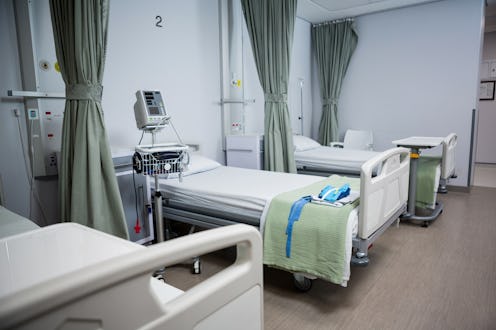Life
Women Are More Likely To Survive A Heart Attack If Their Doctors Are Also Women

While it’s known that heart attack symptoms in women are often different than those experienced by men — and hence harder to spot for some physicians — new research also says that women who enter the ER for heart attack symptoms are more likely to survive if they're assigned to a female physician. According to a recent study published in the journal Proceedings of the National Academy of Sciences, a significant body of research suggests that women are more likely to die from a heart attack if their doctors are men.
Researchers analyzed survival rates following heart attacks in 582,000 heart attack patients admitted to Florida hospitals between 1991 and 2010. They found that while both male and female patients experienced similar survival rates when treated by a female doctor, female heart attack patients were more likely to die when treated by male physicians. Researchers found that when treated by male doctors with more exposure to both female doctors and female patients, women’s survival rates were higher, leading researchers to conclude that women’s health outcomes improve when male doctors practice with female colleagues. According to CNN, the current study is raising crucial questions as to why this particular gap in women’s healthcare exists, and how outcomes can be improved moving forward.
Reuters further reports that lead study author Brad Greenwood, associate professor of information and decision sciences at the Carlson School of Management at the University of Minnesota-Twin Cities, noted that out of every 1,000 women who go to the ER with a heart attack, 15 more will die when treated by a male doctor than if they'd been helped by a female physician. “The key takeaway is that male physicians appear to have trouble treating female patients ... The challenge of [future] research is to figure out how and why this occurs,” Greenwood said.
Reuters reports, however, that many male doctors seem to learn how to treat women patients more skillfully over time. “We do see improvement as they spend time in practice,” Greenwood said, but he stressed that “these later benefits come at the expense of earlier patients.”
CNN reports that heart attack symptoms in men and women are sometimes similar, and include chest pain and discomfort, dizziness, nausea, and extreme fatigue — but women’s symptoms often differ from men's, and younger women are especially likely to have non-chest pain related heart attack symptoms. The American Heart Association reports that while both women and men can experience intense chest pain and pressure during a cardiac arrest, many women have no chest pain during a heart attack. Heart attack symptoms in women can include shortness of breath, pain in the lower chest or upper abdomen, fainting or lightheadedness, intense fatigue, and pressure in the upper back.
Dr. Jennifer Haythe, co-director of Colombia Women’s Heart Center at the Colombia Women’s Health Center told Reuters Health that this study highlights the necessity of having “a strong female physician workforce.” Haythe also said that “As a doctor who is very aware of gender bias, particularly as it relates to cardiac disease, one can’t help but wonder if improved outcomes stem from the fact that female physicians take women’s symptoms more seriously, thereby expediting the workup and cardiac care of these women and improving mortality.”
To that end, maybe this research will lead to further investigation into how gender disparities in the medical system impact women’s health outcomes, and how well women’s heart attack symptoms are understood. And since a woman can’t choose her doctor once she enters the ER, Haythe encourages women to directly ask that their symptoms to be taken seriously. “If they are concerned that they may be having a heart attack they should ask the treating physician — man or woman — if they have had an appropriate evaluation to determine this, and if not, why not.”